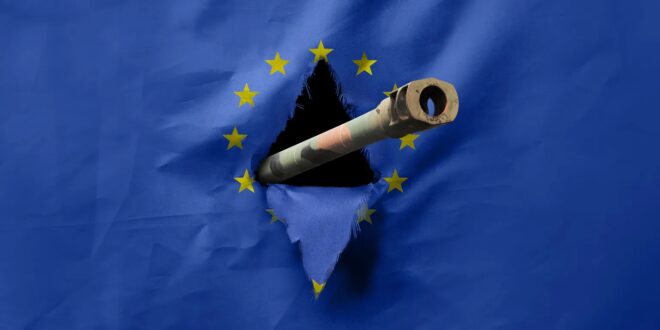No bloc of countries has, for the past 75 years, been as umbilically tied to the United States as Europe. First, its western half and, since the end of the Cold War, much of its eastern half have prospered under the world’s most extensive bonds in trade, finance, and investment. Europe could also depend on the U.S. military’s iron commitment—enshrined in the 75-year-old NATO alliance—to come to its defense. Together with a few other nations, the United States and Europe defined many of the institutions that comprise what we call the Western-led order. The U.S.-European alliance has arguably been the bedrock of the global system as we know it today.
But the era in which Europe could count on the United States may be nearing its end. No matter who wins the U.S. presidential election in November, Washington’s attention is shifting to Beijing and the Indo-Pacific. Should Donald Trump return to the White House, it’s conceivable that the United States could question its commitment to NATO—or even pull out of the alliance altogether, a scenario that will hang over the bloc’s 75th anniversary summit in Washington in July.
Europe could soon face its threats alone. Moscow has unleashed the first major land war in Europe since World War II with the goal of restoring its Cold War empire, which included countries that are now members of the European Union. If the war in the Middle East turns into a greater conflagration, it could send new waves of migrants into the EU. Europe has also turned into a theater of U.S.-Chinese rivalry, with the Russia-Ukraine war the first act in the contest between the Western-led order and the China-led bloc that seeks to revise or destroy it.
The problem for Europeans, as many of their leaders and thinkers will readily admit, is that they are mostly unprepared for a world of hard power. The EU was designed to banish war from the continent, and the absence of large-scale war in Europe between 1945 and 2022—a remarkably long peace, by historical standards—seemed to prove the project’s success. But somewhere along the way, Europeans also began to believe that war was disappearing elsewhere as well—and if not, the Americans would always keep them safe. As EU foreign-policy chief Josep Borrell told a Georgetown University audience in March: “It was almost as if Europeans were saying, ‘For war, please call the U.S.’”
In theory, the EU, with its 450 million citizens, is one of the world’s major power blocs. Its collective GDP is second only to the United States and about 10 times Russia’s. Many of its members, especially those geographically close to Russia, have a hard-nosed, strategic view on the world. But on the whole, Europe has not translated its economic resources into geopolitical power of the kind that could, for example, keep Moscow in check on its own.
The sense that Europe’s long holiday from history is over is palpable in European capitals. After Russia invaded Ukraine in 2022, German Chancellor Olaf Scholz proclaimed a Zeitenwende—a change of eras. More dramatically, French President Emmanuel Macron has warned that Europe “could die” if it does not adapt quickly enough.
The question thus becomes: Can Europe ensure its own security and continued prosperity with less support from the United States—and learn how to navigate what Borrell called “the forgotten harshness of the world” on its own? We asked nine prominent thinkers for their views on whether Europe is ready for a post-American future. Read on below for their responses, or click on a name for the individual author.
 Eurasia Press & News
Eurasia Press & News



